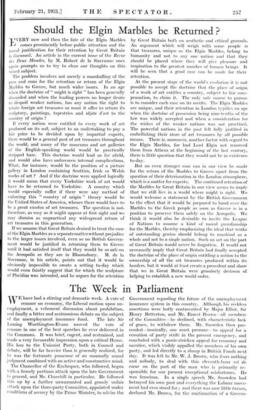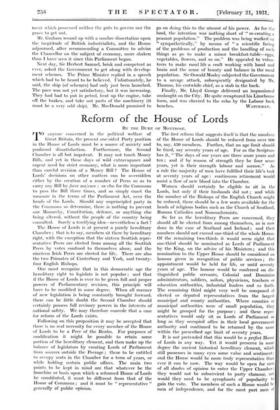The Week in Parliament
WE have had a stirring and dramatic week. A vote of censure on economy, the Liberal motion upon un- employment, a vehement discussion about prohibition, and finally a bitter and acrimonious debate on the subject of the unemployment insurance fund. The late Sir Laming Worthington-Evans moved the vote of censure in one of the best speeches he ever delivered in the Commons. It was brief, cogent, and restrained, and made a very favourable impression upon a critical House. His loss to the Unionist Party, both in Council and debate, will be far heavier than is generally realized, for he was the fortunate possessor of an unusually sound judgment combined with an active and constructive mind.
The Chancellor of the Exchequer, who followed, began with a fiercely partizan attack upon the late Government in general, and Mr. Churchill in particular. He followed this up by a further unwarranted and grossly unfair attack upon the three-party Committee, appointed, under conditions of secrecy by the Prime Minister, to advise the Government regarding the future of the unemployment insurance system in this country. Although his reckless assertions were hotly controverted by Major Elliot, Sir Henry Betterton, and Mr. Ernest Brown—all members of the Committee—he declined, with characteristic lack of grace, to withdraw them. Mr. Snowden then pro- ceeded—ironically, one must presume—to appeal for a cessation of party strife in the present emergency, and concluded with a panic-stricken appeal for economy and sacrifice, which visibly appalled the members of his own party, and led directly to a slump in British Funds next day. It was left to Mr. W. J. Brown, who fears nothing and nobody, to deal with this eleventh-hour era de coeur on the part of the man who is primarily re- sponsible for our present exceptional misfortunes. He was ferocious. In a single speech Mr. Snowden had betrayed his own past and everything the Labour move- ment had ever stood for ; and there was now little excuse, declared Mr. Brown, for the continuation of a Govern- lucid which possessed neither the guts to govern nor the grace to get out.
Mr. Graham wound up with a sombre dissertation upon the ineptitude of British industrialists, and the House adjourned, after recommending a Committee to advise the Chancellor on the subject of economy, more shaken than I have seen it since this Parliament began.
Next day, Sir Herbert Samuel, brisk and competent as ever, asked the Government to get along with develop- ment schemes. The Prime Minister replied in a speech which had to be heard to be believed. Unfortunately, he said, the ship (of schemes) had only just been launched. The pace was not yet satisfactory, but it was increasing. They had had to put in petrol, heat up the engine, take off the brakes, and take out parts of the machinery (it must be a very odd ship). Mr. MacDonald promised to go on doing this to the utmost of -his power. As for the' land, the intention was' nothing short of " re-creating a peasant population." The problem was being worked on " sympathetically," by means of " a scientific facing of the problems of production and the handling of such things as go to make a minor breakfast-table--eggs, vegetables, flowers, and so on." He appealed to volun- teers to make rural life a craft working with hand and brain and the sense of beauty and balance in the rural population. Sir Oswald Mosley subjected the Government to a savage attack, subsequently designated by Mr. Thomas, his erstwhile chief, as a stab in the back.
Finally, Mr. Lloyd George delivered an impassioned onslaught on the City. He quite recaptured his Limehouse form, and was cheered to the echo by the Labour back












































 Previous page
Previous page